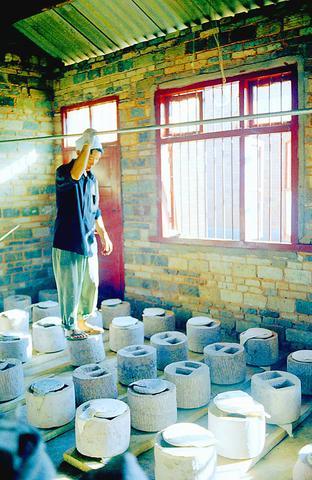What happens when a Wong Kar Wai (
documentary."
To the possible surprise of many people, the trendy pop-style show will air on the National Geographic Channel -- which is famous for shows about wild animals, science and historical documentaries.

PHOTO COURTESY OF NGC
Two-Way Tea Journey (
The story of the film is, like the title suggests, a two-way journey. On one hand, it's a search for 5,000 years of Chinese tea culture, which was almost ruined by the Cultural Revolution; on the other, it's a personal journey reflecting on a man coming to peace with the trauma of that period in history, through picking up the tea-drinking habit again.
Yuan Jianguo (
The documentary team followed Yuan, first going to Yixing in east China to search for the best quality tea pot, made in the world famous zisha pot kiln (
Finally, Yuan went to Lu Mountain to look for the purest, sweetest spring water, a crucial element to making a good pot of tea.
This tea journey is also a quest of self-discovery and the grief caused by the Cultural Revolution is analyzed along the way.
The score of Lim offers a different pace for this sentimental part of the journey. It is sometimes lively and light-hearted, sometimes slow and chill -- and sometimes tranquil like new age music.
"When the director, Lee asked me to do music for the film, he said he wanted the music to be the narrator. So I tried to make the music play the part of the voice-over," Lim said.
"Lim impresses me with his music. His music sounds international, but if you listen to the beat closely, you can feel that it has a very Chinese feeling. And this is the new Asian perspective I wanted to present in the movie," Lee said.
In other words, this 30-minute, Chinese tea-related film does not re-exploit the stereotypes and symbols of Chinese culture. There are no gongs and drums as a Chinese music background and no grand overview of a giant temple. Instead, the visual style is similar to acclaimed Hong Kong director Wong Kar Wai.
Lee's two previous films are documentaries of two of Wong's feature films. In 2000, Lee co-directed Buenos Aires Zero Degree, the Making of Happy Together. And in 2001, he was the co-director of the movie The Making of In the Mood for Love.
"Wong has had a great influence on him [Lim], especially in the use of music," Lee said.
Wong has previously said that the starting point for many of his movies is usually a piece of music or a song that he hears, rather than a script or idea.
"I was also inspired by the music of Lim and let the image follow the music. In this film, the music goes in front," he said.
The new documentary style has been recognized by the National Geographic Channel as Two-Way Tea Journey was the winner of Reel Talent, an award category under the Showing Real Asia project, which recognizes young Asian directors under the age of 35. As for Lee's next film: "I will also apply for funds from this project," he said.
For your information: Two-Way Tea Journey will be screened on the National Geographic Channel at 9:30pm, tomorrow.

Every now and then, it’s nice to just point somewhere on a map and head out with no plan. In Taiwan, where convenience reigns, food options are plentiful and people are generally friendly and helpful, this type of trip is that much easier to pull off. One day last November, a spur-of-the-moment day hike in the hills of Chiayi County turned into a surprisingly memorable experience that impressed on me once again how fortunate we all are to call this island home. The scenery I walked through that day — a mix of forest and farms reaching up into the clouds

With one week left until election day, the drama is high in the race for the Chinese Nationalist Party (KMT) chair. The race is still potentially wide open between the three frontrunners. The most accurate poll is done by Apollo Survey & Research Co (艾普羅民調公司), which was conducted a week and a half ago with two-thirds of the respondents party members, who are the only ones eligible to vote. For details on the candidates, check the Oct. 4 edition of this column, “A look at the KMT chair candidates” on page 12. The popular frontrunner was 56-year-old Cheng Li-wun (鄭麗文)

“How China Threatens to Force Taiwan Into a Total Blackout” screamed a Wall Street Journal (WSJ) headline last week, yet another of the endless clickbait examples of the energy threat via blockade that doesn’t exist. Since the headline is recycled, I will recycle the rebuttal: once industrial power demand collapses (there’s a blockade so trade is gone, remember?) “a handful of shops and factories could run for months on coal and renewables, as Ko Yun-ling (柯昀伶) and Chao Chia-wei (趙家緯) pointed out in a piece at Taiwan Insight earlier this year.” Sadly, the existence of these facts will not stop the

Oct. 13 to Oct. 19 When ordered to resign from her teaching position in June 1928 due to her husband’s anti-colonial activities, Lin Shih-hao (林氏好) refused to back down. The next day, she still showed up at Tainan Second Preschool, where she was warned that she would be fired if she didn’t comply. Lin continued to ignore the orders and was eventually let go without severance — even losing her pay for that month. Rather than despairing, she found a non-government job and even joined her husband Lu Ping-ting’s (盧丙丁) non-violent resistance and labor rights movements. When the government’s 1931 crackdown